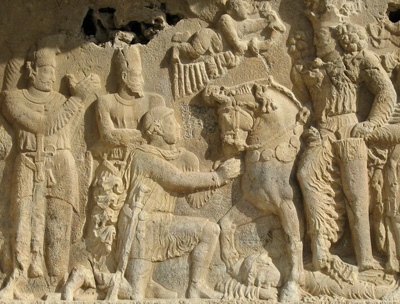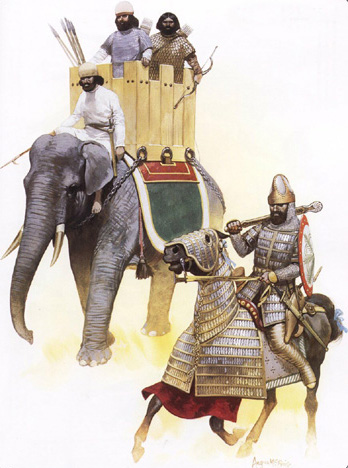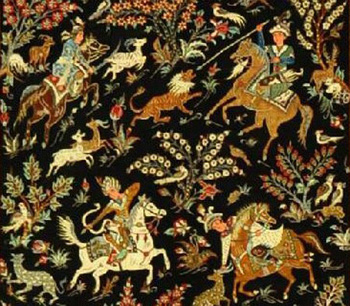 |
The Saint of the Day
St. Millas – May 7
Prof. Plinio Corrêa de Oliveira
Biographical selection:
St. Millas was born in Persia to a noble family. He served at the court and in the royal army. After converting to Catholicism, he dedicated himself to an intense work of apostolate. In his city. Despite his efforts for the conversion of the people, he was dragged through the streets over 100 times for preaching the words of salvation. Finally, one day, when he was half-dead, he was thrown out of the city.

A Persian satrap being received by military officers |
He continued his work in another satrapy but was imprisoned by Hormisdas, governor of that province, who ordered Millas to adore the sun. When the Saint refused, the tyrant called Millas before him and mockingly asked these questions: “Who are you, a god or a man? What is your religion? What are your beliefs? Tell them to us. Give testimony of your wisdom so that we may become your disciples. But if you want to hide your sect’s teaching, you will die here like an animal.”
The holy Bishop responded: “I am a man, not a god. As for the truths of my religion, I speak of them only with profound respect and do not reveal its sacred mysteries to impure ears. Listen to these words, the only one I will speak to you: Unfortunate man, impious and cruel tyrant, and those unfortunate ones who, like you, are enemies of God and His Church. This same God will judge you and will send you to the hellfire, with its darkness and gnashing of teeth, because you have received wealth and riches from His Goodness and, far from being grateful, you use them to offend Him.”
Hearing these words, Hormisdas rose angrily from the tribunal, rushed forward and stabbed the Bishop. His brother who was present beside joined in the act. The martyr fell to the floor, but before expiring, made this terrible prophecy against the assassins:
“Since fraternal love united you in the same crime, making you spill innocent blood, tomorrow, at this very time and place, your own blood will be spilled by your own hands. The dogs will come to lick your blood and the birds of prey will eat your flesh. On that very day, your mother will mourn for her two sons and both your wives will become widows.”
The next day the two brothers went out to hunt and, as they chased a deer, they simultaneously launched their arrows, fatally wounding one another. They fell at the same place where St. Millas had died, and everything passed as he had predicted. This chastisement filled the people with astonishment throughout the country.
The body of the martyr was brought to Malcom Castle and buried there. In the wars that came, the Arabs never conquered this Castle. This was considered a miracle attributed to the remains of the Saint that rested there (from Abée Profillet, Les Saints Militaires, Paris 1890).
Comments of Prof. Plinio:
In this selection you see how grace perfects nature. This man was a Persian warrior. Persia was one of the major empires of Antiquity, and in various epochs of History the Persian army was famous for its braveness. You see that St. Millas did not lose the soul of a warrior, but kept it intact when he became a Bishop. Assuming the pastoral mission, he became a shepherd in the fullest sense of the word: a battler shepherd, not just a shepherd turned toward pasturing his sheep. What a magnificent thing! This is the perfection: to be able to care for his flock and fight for them when necessary.

A Persian knight and, in the background, some soldiers |
You see that he was dealing with a very evil people. None of them followed him. Can you realize the great pertinacity of a Bishop who continued to preach even after being dragged through the streets more than 100 times? He only left the city when the inhabitants threw him out, half-dead. Then he understood that their wickedness had reached its apex and he should abandon it.
He left the city and went to another satrapy. The satrapies were provinces of the Persian Empire and their governors, the satraps, had a jurisdiction in their territories almost as complete as that of the Emperor. In one of these satrapies, he was called before the satrap to give an account of his faith.
The pagan met the Saint and, as he prepared to kill him, he mocked him before the onlookers, asking this question: “Are you a god or a man?” By the question you can see the splendor of the personage of St. Millas! Here we see the characteristic attitude of a son of darkness before a superiority he does not accept but is obliged to acknowledge: “Are you of our nature or one much superior to ours?” This was his first question.
The other insidious questions refer to a policy of the Catholics at that time, which was to keep a part of her holy doctrine secret in order to prevent the mysteries of the Faith from being mocked by persons unprepared to receive them; to prevent impiety from abusing the deposit of the Faith. The faithful used to reveal only some principles of the Catholic doctrine and, after the person had proved himself trustworthy, they would teach the rest of the doctrine, principally regarding the Holy Eucharist and the Mass.
That satrap knew about this hidden doctrine of the Catholics – probably through the report of a traitor, a Judas – and pressured him to declare it: “You must tell me, or else you will be killed here and now.”
He did not demand that St. Millas directly deny the Faith; he ordered him to tell the mysteries that should not be revealed to men of bad will. St. Millas, understanding the respect he owed to this Church policy and the obligation he had to prevent blasphemy and mockery of the Catholic Religion, preferred to die.
Here you have another interesting point. It was the pagan who discerned something mysterious in this Religion, something noble and elevated that exceeded his comprehension. He frantically wanted St. Millas to reveal these mysteries, not to be instructed, but so that he might blaspheme and slander it. Then, he ordered: “Tell me!” The Saint perceived his hatred and refused.
If St. Millas had thought that he could do any good for the souls of the satrap or those present, he would have answered and explained the Catholic doctrine. He did not do so because he discerned they were bad-intentioned. After he spoke, the two brothers became enraged and killed the Saint.

Persian nobles hunting |
This Saint did not die forgiving and absolving his murderers or asking the blessings of Heaven for his persecutors, as many other Saints did. He died cursing and combating them, announcing the chastisements of God that would fall on them: “You, who are brothers in crime, will die together tomorrow at this time and in this way.”
The next day the prophecy was fulfilled, as recorded in the poetic style of the East: “On that very day your mother will mourn for her two sons, and both of your wives will become widows.”
He died and the example of his very anti-ecumenical firmness and the fulfillment of his prophecy made a great impression on many people. It raised a fear of God and a horror for the crime committed. Then his body was transferred with veneration by those persons and buried in a faraway Castle. His body became such a bulwark against the enemies that no one could conquer the Castle. Centuries later, when the Islamic persecutions came, the Muslims destroyed everything but they could never take that Castle. The brave St. Millas continued to challenge the enemies of the Church and no one could defeat him.
It is a beautiful example for us counter-revolutionaries! What could be more beautiful than to fight until the last moment of our lives? To the last moment speak out against the Revolution and reveal what the revolutionaries really are! And then, to have our cadaver on earth remain as a bastion against the enemies! To have every enemy fear it; no one daring to draw near it! This would be a recompense that is an image of our celestial reward.
Let us ask St. Millas to make us similar to him, to give us his force and virtue. Let us ask him to make us understand his school of sanctity so that we will be hammers against the Devil and heretics to the end.
In the family of devotees of Our Lady, we must be the heel: a low and humble part of the body, but the part that has the glory of smashing the head of the serpent. This is what we should ask: to smash the head of the Revolution.
These are the comments suggested by this text on the life of St. Millas.


  |
|
Prof. Plinio Corrêa de Oliveira | |
The Saint of the Day features highlights from the lives of saints based on comments made by the late Prof. Plinio Corrêa de Oliveira. Following the example of St. John Bosco who used to make similar talks for the boys of his College, each evening it was Prof. Plinio’s custom to make a short commentary on the lives of the next day’s saint in a meeting for youth in order to encourage them in the practice of virtue and love for the Catholic Church. TIA thought that its readers could profit from these valuable commentaries.
The texts of both the biographical data and the comments come from personal notes taken by Atila S. Guimarães from 1964 to 1995. Given the fact that the source is a personal notebook, it is possible that at times the biographic notes transcribed here will not rigorously follow the original text read by Prof. Plinio. The commentaries have also been adapted and translated for TIA’s site.
|
Saint of the Day | Home | Books | CDs | Search | Contact Us | Donate

© 2002- Tradition in Action, Inc. All Rights Reserved
|
 |

|